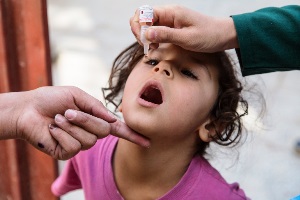 Kabul, 27 March 2017 – The Ministry of Public Health of Afghanistan, together with WHO and UNICEF, has inaugurated the first round of National Immunization Days (NIDs) for polio eradication in 2017 in a ceremony held in Kabul. The campaign will start today in 31 provinces of Afghanistan with the aim to vaccinate over 8.9 million children under the age of 5 against polio and provide them with vitamin A tablets.
Kabul, 27 March 2017 – The Ministry of Public Health of Afghanistan, together with WHO and UNICEF, has inaugurated the first round of National Immunization Days (NIDs) for polio eradication in 2017 in a ceremony held in Kabul. The campaign will start today in 31 provinces of Afghanistan with the aim to vaccinate over 8.9 million children under the age of 5 against polio and provide them with vitamin A tablets.
The Minister of Public Health Dr. Ferozuddin Feroz inaugurated the campaign by vaccinating children during the inauguration ceremony. He highlighted the importance of all parties to the conflict respecting the neutrality of the Polio Eradication Initiative. “We need the help of all Afghans in providing a safe working environment in which our polio volunteers and frontline health workers can perform their duties safely and successfully and reach all children with life-saving vaccines,” he said.
During the campaign, over 61 000 trained polio workers will go from house to house in their communities to vaccinate children. On Friday, polio teams will re-visit households where children were missed the first time the vaccinators visited to ensure that all children are vaccinated and protected.
All caregivers who miss having their children vaccinated should visit their local health centre where the vaccine is available free of charge. The polio vaccine is safe and it does not have any side effects, even for sleeping or sick children and newborns. Polio vaccines have also been strongly endorsed by national and global Islamic scholars, including the Ulama.
Afghanistan, Pakistan and Nigeria are the only three countries in the world where polio is still circulating. Most of Afghanistan remains polio-free, but wild poliovirus continues to circulate in localized geographical areas in the eastern, southern and south-eastern parts of the country.








